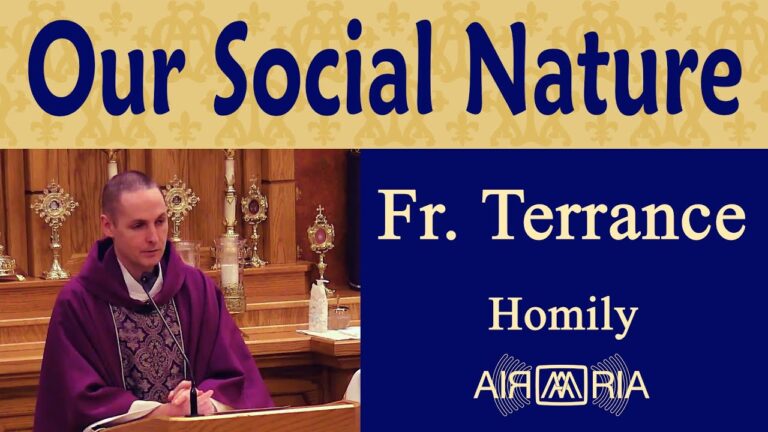Praised be Jesus and Mary, now and forever. Our series on Franciscan spirituality, we’ve been looking at how the human person and human nature fit into God’s plan, so today we’ll talk about the social aspect a little bit. Father Ciccarelli in his book On the Cornerstones
Of Franciscan Spirituality has an interesting take on this, he says, man isn’t so much an individual like a fragment of matter, as he is a distinct person who places himself in the totality of his being, and as a person he isn’t a monad closed in a solitude of his own being,
But rather open to God and open to his neighbor. It’s in this openness that we find the essence of our sociality, which is a person-to-person relationship with God, but with others as well. We’re in continual society with God because we receive from him our being and our life,
And also through the love that God awakens in our hearts, and by which he establishes family ties with us in Christ, so that’s our relationship with him, but we’re also in society with our neighbor, towards whom we’re directed in our various activities.
The livelier and more continuous this projection of our activities and energy will be, the more extensive and profound our relationships will be, and the more intense and stable the activity of single persons will be in the family, at work, in the moral, spiritual, economical,
Social sphere of life, the more societal life will become profound and effective in a good way. Father Ciccarelli says that St. Francis was one of the most open and loving souls and one of the most social persons that humanity has ever known. The soul of his sociability was his uncontainable
Need to give himself to God and to his neighbor without any consideration of personal interest. Regarding his neighbor, St. Francis’s sociability with others was original, and it was bold too, even more bold if you consider the times that he was living in.
One can say that his greatest merit was to have started a movement with such a vast social impact that even today its effects still endure, and he did so by very simple means and without even really having the plan or the intention or the approach of a reformer.
His one focus was a wholehearted return to the Gospel, a Gospel which he wanted everyone to fall in love with as he himself had. His love for Jesus, the desire to reproduce his way of life, made Francis go beyond the attraction of an exclusively recollected and
Penitential life in a cloister or in an isolated hermitage, and it sent him out into the streets and into the towns, into the villages to preach the Gospel to everyone. He gave himself to his brothers. He sacrificed himself for them, shared their work,
Their pains, their joys, especially those of people who were humble and looked down upon. Francis did all this without diminishing the intensity of his life of prayer. His encounters with others made his prayer life more intimate and more vigorous as well.
That was the program of our saint who, as his biographer Thomas of Celano notes, was the first founder of a religious order to send his brothers out two by two to preach the Gospel to the whole world, first one after our Lord to do that. St. Francis was animated by pure charity in
His helping to alleviate human misery with the lepers and the poor, instituting a third order for lay people who wanted to embrace his evangelical spirit and still live in the world, and establishing peace between civil powers and ecclesiastical authorities and other factions of his time. Francis initiated missions among the unbelievers,
Outlining arduous plans for the extension of Christ’s kingdom throughout the whole world. He wrote letters to princes, governors, to all the faithful. He sent out his brothers to preach and to bring peace and healing to others in the spirit of
Poverty, humility, and fraternal charity. He wanted all of humanity to be rooted in the fraternity of Christ, and he told his friars that they had to be like evangelical leaven in all the world. He wrote in his first rule, he said it,
And they ought to rejoice when they converse with mean and despised persons, with the poor and the weak, with the infirm and lepers, and with those who beg in the streets. And they should love each other, as the Lord tells us to,
And show with their works their mutual love. And let all the brothers take care not to calumniate anyone, nor contend in words. Let them not murmur, not talk behind people’s backs, nor judge, nor condemn anyone, said St. Francis.
So the one who called brothers and sisters, all the creatures of the good God, and even death, St. Francis called death sister death, right? The one who sang brother sun, sister moon, and the stars, and sister water, and our mother earth, he sent out among men
The invisible strings of a profound, simple attraction founded on evangelical charity. It was like a warm appeal, the calling of a voice which echoed that of Jesus, in order to bring all men back to the love of the sweet, crucified Savior, in
Whom alone is rooted our universal brotherhood. In this way, St. Francis gave the most universal and lively push to his evangelization and that of his brothers, that of a spontaneous and cordial socialness, which he was very famous for. Let’s ask Our Lady for the grace to extend more of
A spirit of fraternity and selfless charity towards others, a spirit which St. Francis and the Franciscan school tries to instill in those who seek to follow the example of Christ. Praised be Jesus and Mary, now and forever.
source
